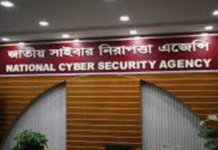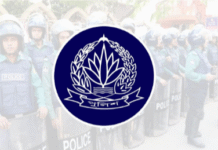
The cabinet on Monday endorsed in principle the draft Digital Security Bill–2016, proposing life-term jail and Tk one core in fine as maximum punishment for spreading propaganda against the country’s founding president Sheikh Mujibur Rahman and the 1971 liberation war through electronic media or any other digital devices.
The information and communication technology division placed the draft in the weekly cabinet meeting at the secretariat with the prime minister, Sheikh Hasina, in the chair.
The cabinet asked law minister Anisul Huq to scritinise the draft as several ministers pointed out that many provisions of some similar laws were overlapped there.
The PM, however, expressed her annoyance at the publication of a ‘costly’ booklet on the draft Digital Security Bill, the copies of which were distributed among the cabinet members, said a minister.
The draft bill was printed on ‘glossy papers’ although photocopies of such document were usually provided in the cabinet folders in ordinary papers, he mentioned.
‘One will be punished with maximum life-term imprisonment and a fine of Tk one crore for spreading propaganda through electronic media against any issues of the liberation war, which are already settled by the court, or against father of the nation Sheikh Mujibur Rahman,’ cabinet secretary Mohammad Shafiul Alam told a press briefing after the meeting.
He said the law minister was asked to review the draft so that similar provisions in other laws were not overlapped here and place it again in the cabinet for final approval.
The draft proposes setting up a ‘Digital Security Agency’ to deal with cyber offences defined in the law.
The proposed agency will have the authority to ask the enforcement agencies on emergency basis to stop transmission of anything through the electronic devices in violation of the law, the cabinet secretary said.
‘I have been asked to review the draft with the cooperation of all concerned to make sure there is clarity and no provision is overlapped,’ said Anisul Huq, also a lawyer by profession,
Asked for his comment, he said, the government wanted that there was no confusion over any provisions in the proposed law.
The law minister said there were both bailable and non-bailable offences in the draft law.
The cabinet secretary said the maximum punishment for hacking important cyber infrastructure of any government agencies or for committing cyber terrorism as defined in the anti-terrorism law would be 14 years of imprisonment and a fine Tk one crore.
One will be punished with five-year jail and Tk three lakh in fine for forgery or fraudulences or threats through using mobile/digital devices, Shafiul said.
He said Sections 54, 55, 56 and 57 of the Information Communication Technology Act would be incorporated in the proposed Digital Security law.
The punishment for hacking with the computer system is mentioned in the section 56 of the ICT Act.
According to the Section 57 of the ICT law as amended in 2013, if any person deliberately publishes any material in electronic form that causes to deteriorate law and order, prejudice the image of the State or person or causes to hurt religious belief the offender will be punished for maximum 14 years and minimum 7 years imprisonment. It also stipulates that the offence is non-bailable.
A minister said that the draft was prepared without any consultations with other ministries like information, home affairs and science and technology ministry.
The law minister was asked to consult all other stakeholders including home ministry, information ministry, telecom ministry and science and technology ministry to make sure the draft does not contradict other laws, a minister told New Age.
He said the finance minister asked why such a costly booklet was published before the draft was approved by the cabinet.
The prime minister reacted as the meeting was informed that it cost only Tk100 to publish each booklet, the minister told New Age preferring anonymity.
The PM said such a publication with glossy papers was not possible with Tk100 for each copy, according to the minister.
The cabinet also approved in principle the drafts of the Hindu Religious Welfare Bill–2016, Buddha Religious Welfare Bill–2016 and Christian Welfare Bill–2016 to replace the ordinances promulgated during the martial law regimes, said the cabinet secretary.
Source: New Age









